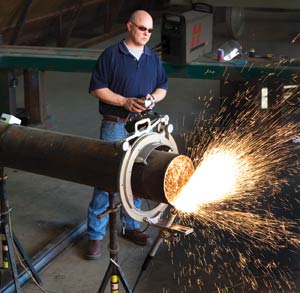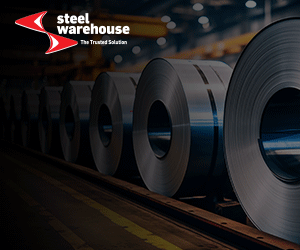Column
Filter by Process Zone:
WELDING IN THE ENERGY SECTOR: CAN A PROCESS CHANGE HELP MEET INCREASING DEMANDS?
As the demands for energy continue to increase worldwide, fabricators serving this industry will be challenged to remain competitive by changing from the stick welding process to a gas-shielded flux-cored welding process. Tim Hensley of Hobart Brothers explains why they must carefully assess their quality needs and available labor or training ability before making this sort of switch.
EDUCATION: CHANGING THE STATUS QUO
Doing More With Less: Guest columnist Dale Petts of Simonds International sees a perfect storm brewing as baby boomers retire and young people view factory work as dirty, dangerous and unfulfilling. But he also sees an industry that is discovering how online training technology can build the competitive value of its workforce.
FROM TRAINING TO PRODUCTION: NOW YOU SEE IT, NOW YOU DO IT
An offline personal computer can be used to train the operators, who then run the program on a virtual control to prove it out, all before running it on a costly machine tool . . . Randy Pearson of Siemens Industry explains how this evolution of the quasi-CAM system brings so many advantages to the shop.
USING 1 PERCENT NICKEL ELECTRODES FOR HIGHLY RESTRAINED WELDS, HIGHLY HARDENABLE STEELS

Circumstances exist in which the selection of low-hydrogen, mild steel electrodes such as ER70S-6 solid wire or E7018 stick electrode is not enough to prevent weld cracking. Regis Geisler of Lincoln Electric explores the reasons for this and offer possible alternatives to these filler materials.
JUST CULTURE
Does the overall culture of a company have at least as powerful an influence on worker safety as the actions of the workers themselves? In exploring this controversial safety philosophy, Phil La Duke of Rockford Greene investigates whether an environment where people feel comfortable making and reporting mistakes is better equipped to determine the root cause of a problem and implement counter measures to prevent recurrence.
PROPER CARE AND MAINTENANCE
Even though a machine tool spindle is a high-precision machine component, more often than not it is handled carelessly, forced to perform well beyond design limitations, or otherwise abused to the breaking point. Ed Zitney of SKF Machine Tool Services shows how proper care and maintenance can make all the difference in both its operation and longevity in service.
NON-WOVEN ABRASIVES EXPAND RIGHT ANGLE GRINDING POSSIBILITIES
Right angle grinders have traditionally used grinding wheels, fiber discs, wire brushes, and flap discs for stripping, deburring, blending, prepping and finishing. But David Long of Saint-Gobain Abrasives explains why non-woven abrasives are now replacing traditional coated abrasives as a faster and more cost effective method.
Improving Feedability in Aluminum Welding
Due to the poor column strength of aluminum, the wire easily bends or twists when pushed through a typical GMAW wire feeder and gun system, causing “bird-nesting.” Thom Burns of AltoTec shares some ways to prevent this problem.
PLASMA CUTTING: VERSATILE FOR BOTH MANUAL AND MECHANIZED CUTTING APPLICATIONS

The cut quality, consumable life and reliability of the plasma cutters used in the past is just that – a memory of the past! Let’s evaluate the different categories of new plasma cutting systems to show how they can benefit those fabricators of steel parts that have traditionally used traditionally oxy-fuel cutting.
The Evolution of the Hybrid Laser Arc Welding Revolution
Moving Beyond “Wait and See”: Geoff Lipnevicius of Lincoln Electric examines how the hybrid revolution is building momentum as manufacturers embrace the higher travel speeds, increased depth of penetration and deposition rates of a ‘hybrid’ materials-joining process that captures the unique advantages of two distinct sources of energy – laser power and arc welding.
Prairie Muffins: THE U.S. Debt Ceiling
A Reckless Threat: The clock is winding down as the markets anxiously wait for the honorables to make a decision about the government debt ceiling. Here’s the kicker: Even if the latest round of budget talks fail, well-known economist Peter Morici explains why the U.S. does not have to default on national debt and why higher taxes are not needed.
Closing the Wall Street Casino
The Elephant In The Room: Guest columnist and well-known economist Peter Morici shares some thought-provoking business insights in this great analysis of why kids are going to school to get degrees and no one is making things.














